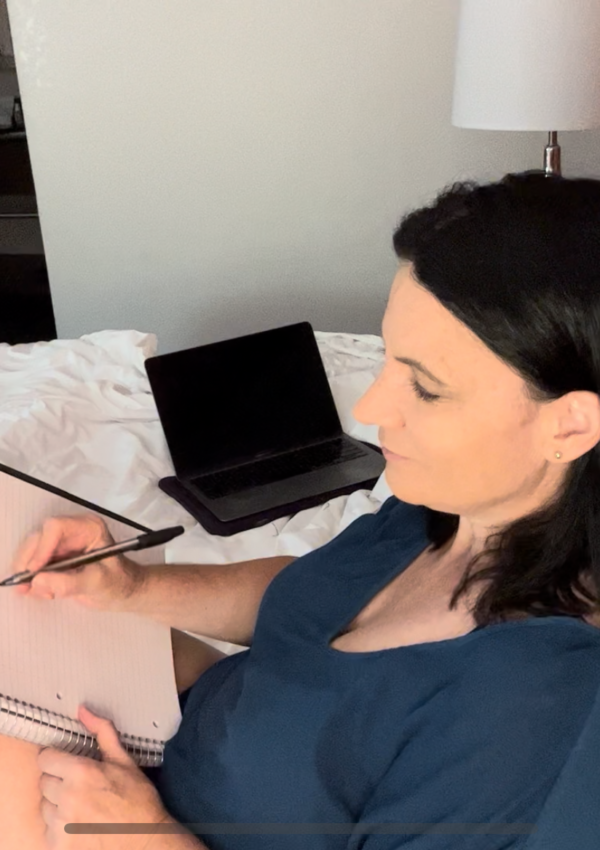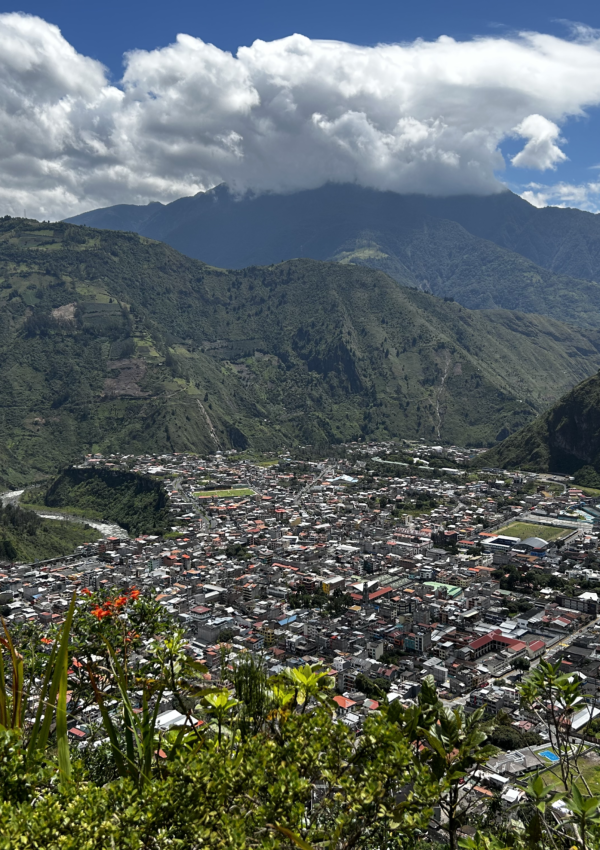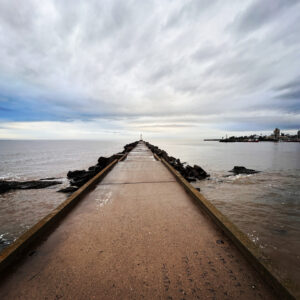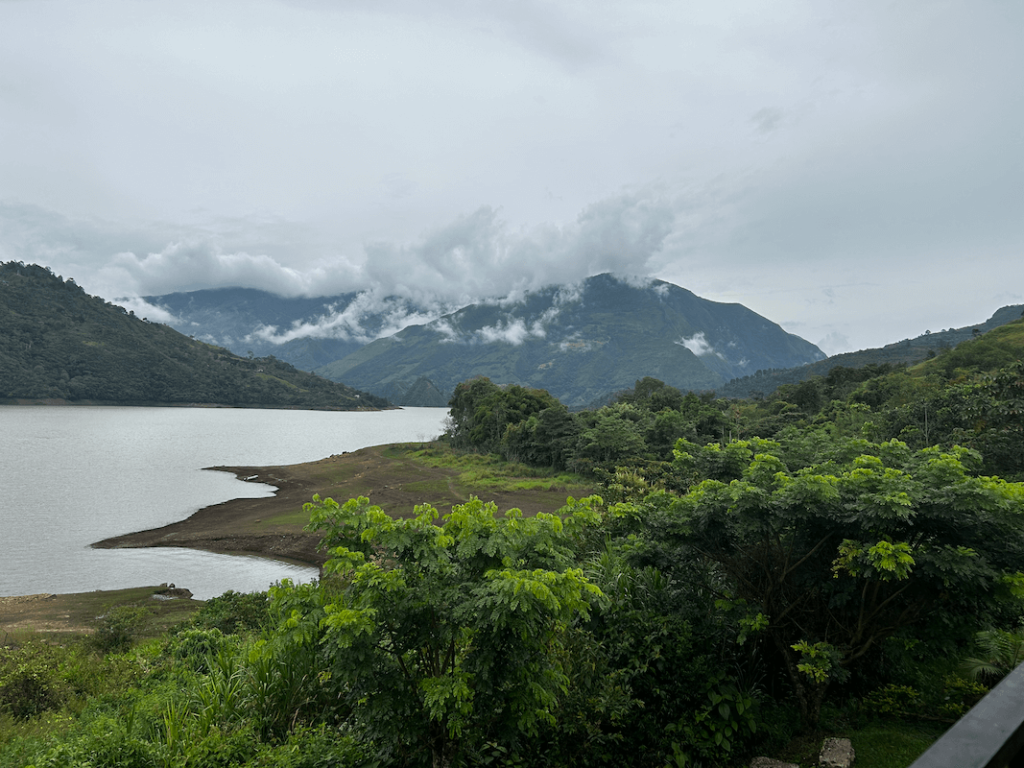My Bolivia adventures kicked off the night before my flight, as I tried to check in.
I’d done my research and was ready to purchase the Bolivian tourist visa on entry. I had my paperwork ready and was set to go….. except, the airline wouldn’t allow me to check in without having a visa in place.
Interesting nomad-ing fact: airlines are frequently more strict about immigration requirements than the actual immigration department of a country – as it’s the airline that’s responsible for footing the bill to send you back, if you aren’t allowed in. But, I wasn’t prepared for this.
It was late on a Friday afternoon in Montevideo, and there was no chance of getting a visa in advance, now. My best bet was to show up at the airport and hope for the best. If they didn’t let me on the plane…. well, I’d come up with a new plan. Maybe hop back over to Buenos Aires for a bit?
Determined, I showed up to the airport four hours early. And after three hours at the Aerolineas Argentina check in counter, and extensive paperwork, I was finally approved to board the plane.
A quick flight to Buenos Aires for a 24 hour layover, and then on to Bolivia!
Meeting Silvana: My Airbnb Host Turned Friend
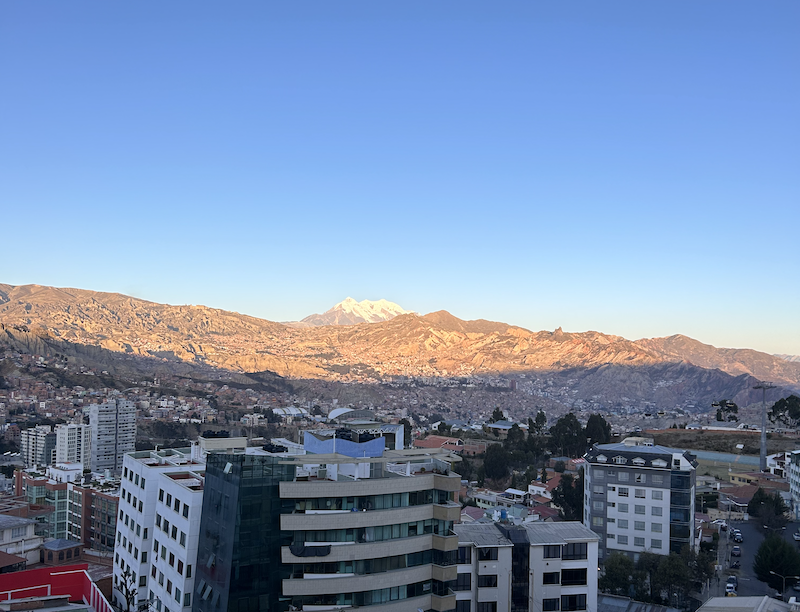
When I arrived, I was welcomed by my Airbnb host, Silvana, who kindly picked me up at the airport.
Fun fact: El Alto is the highest major airport in the world, and I felt the effects of the altitude walking through the parking lot.
I shared my visa ordeal with Silvana and she told me, “That sounds like Bolivia…. Bolivians like to make everything complicated.” We laughed, and I knew I was in good hands.
As we drove through the city, Silvana gave me the tour, rich with history.
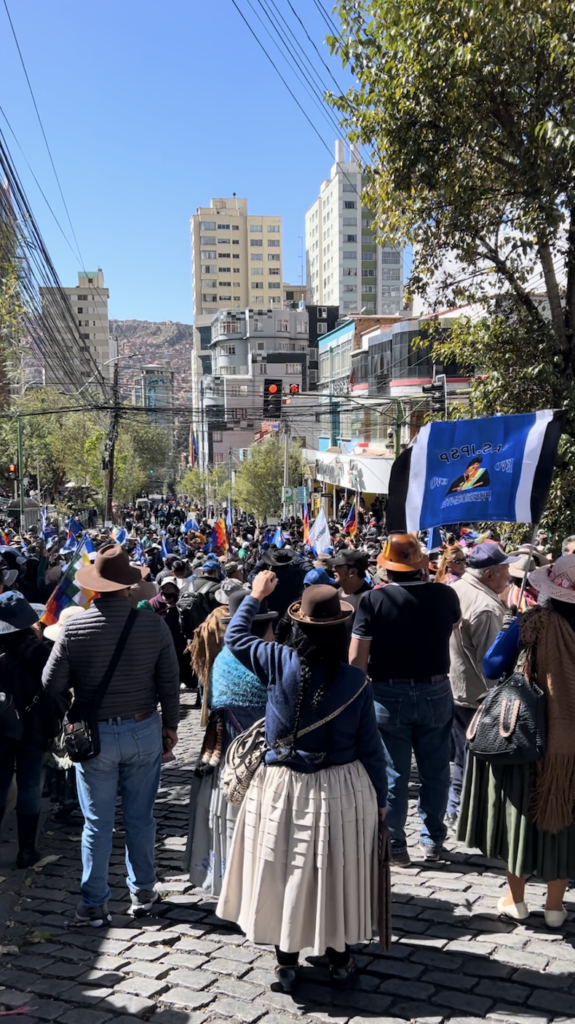
Something that sets La Paz apart from many places in Latin America is how deeply native traditions and cultures are integrated. Unlike many places where native life and traditional culture happens quite separately, in La Paz, it’s a part of everyday life.
Traditional ceremonies and festivals are common, and as we drove through the cobblestone streets, the high-rise buildings towering over head with a fascinating mixture of old and new, Silvana filled me in on the numerous festivals and holidays that would be happening while I was here.
I learned how a large percentage of the population spoke Quechua and Ayamara, the native languages, and that former President Evo Morales had made 36 native languages “official.”
“La Paz is a very safe city“, Silvana told me. “Everyone walks everywhere. You can walk all around. By the way, you’ll see and hear lots of protests happening all the time… but they’re not dangerous. It’s just a way of life. Everyone is always protesting.
“Who’s protesting? About what?” I asked.
“Oh, everything. Miners wanting better working conditions. Bus drivers, wanting things to be different. Oh, and you will see some protests around the court where the election ballots are counted”
My apartment was across the street from where the election ballots were counted.. and I would, in fact, see lots of protests.
The Mountains.
As we drove, I saw the cable cars overhead “Oh, cool – is that to see the views?” I asked?
“no…. that’s just our regular public transportation” Silvana told me. “La Paz is…. like we’re in a hole – surrounded by mountains. The mountains are very spiritual to us. Traditionally, the mountains are considered to be like Gods.“
… I suddenly knew why I’d come to La Paz.
Silvana was telling me more: “The mountains are really important to us. Going up to the lookout points around the city is such a part of La Paz. As a kid, you go up to the lookout points to play with your friends. As a teenager, you go up with your boyfriend girlfriend and date. I n university, you go up to the lookout points and have a beer. As adults, you go up to the lookout points and talk about life. it’s just part of what we do.”
“amazing” I said. “… I’ve lived near mountains for most of my life.. and going up to the mountains to think and have space, and look down and see the city below has always been one of my favorite things to do”.
“AHHHH, so you are from La Paz!!” Silvana said, laughing.
Lookout Points
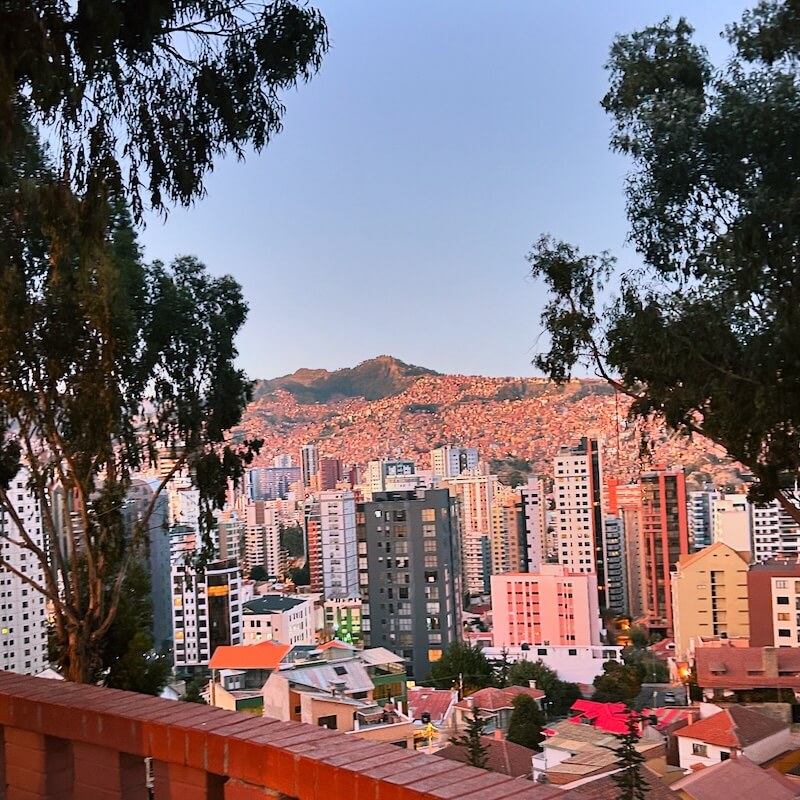
“Want to see a lookout point?” Silvana was asking me.
“Yes!!!!” The long travel day suddenly didn’t matter.
Silvana took me to Parque Monticulo, just a short distance from where I’d be staying. The June winter air was chilly, but the views were amazing.
We passed a church at the top of the hill. “During the period of Bolivia’s dictators, this was where people would meet to discuss plans to revolt.” Silvana told me.
“They would hide dissidents in the church, hide them from the government. it’s like a rebel church.”
Home
And then, we went home to my new airbnb.
Silvana showed me the market across the street. “You can get fresh bread there every day – that’s the place to get good fresh bread – but go early to get it!”
Silvana had left me a delicious spread of fresh bread, jam, papaya, oranges, veggies fruit, coffee, and tea, including coca tea for the altitude. There was an avocado that was huge. I’d never seen an avocado that huge. It was three times the size of avocados in the States. “Oh, no, this is just a normal size avocado!” Silvana told me.
I made myself a cup of coca tea, curled up on the couch under a blanket, and feasted on fresh bread and avocado.
Immediatamente, home.
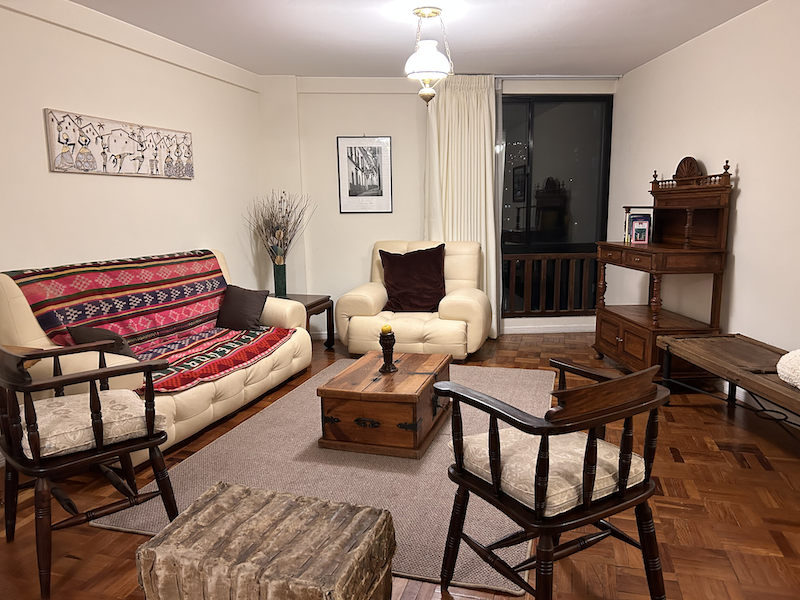
Adjusting to the Altitude
The altitude hit me the first night.
I’d never experienced anything like it… it felt a bit like the moment after you’ve finished an intense run or workout, and the body and breath are trying to sync up again… but they haven’t quite found the connection and you can’t quite catch your breath.
It felt like that – except instead of running, I was simply lying in bed. It was a bit scary. Each time I started to drift off to sleep, I’d be jolted awake from trying to catch my breath.
“Drink the coca tea! And chew on coca leaves, it will totally help!” Silvana told me the next day.
I ventured out to the market across the street, and to a vegetable stand down the road, run by a woman with a toothless grin and surrounded by a bevy kids. My haul of fruits and vegetables, including another giant avocado and an enormous papaya, cost just twenty-eight bolivianos, or about $4 us dollars.
The coca leaves did, in fact, help. I walked, pausing frequently, a block at a time, up and down the steep streets.
The Lookout Points Again
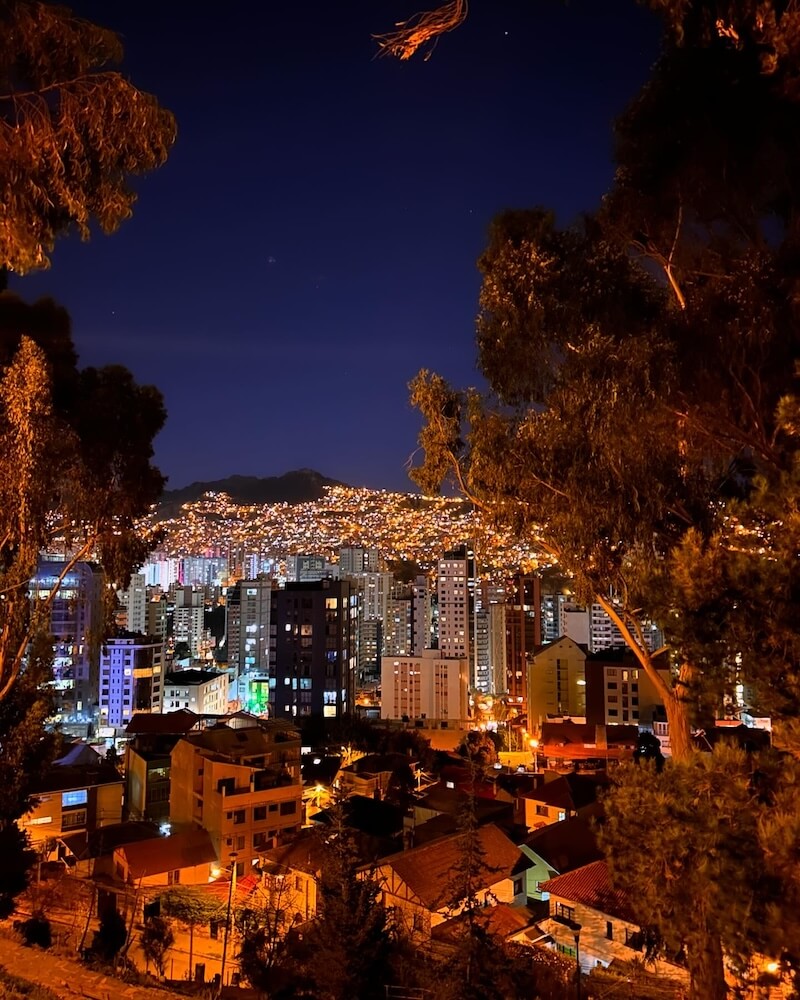
I went out again, a few days later. A single steep block at a time, I could walk the whole way to the lookout point now.
I stood there, taking in the city lights, and felt a rush of creativity and ideas. Was it the altitude? I felt a whole new energy coming through. I didn’t know what it was, yet. Indefinable, but a certain new energy stream, and connected to this place.
I slept soundly that night and woke up the next morning, looked out the window at the city stretched out below, the mountains surrounding in the distance.
I couldn’t quite feel into what was coming, but I could feel that it was amazing.
